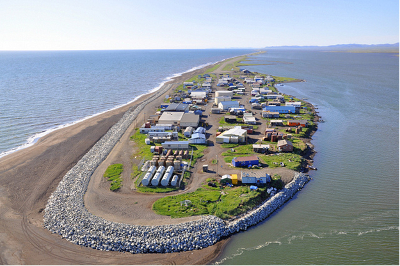Kivalina Island is an eight-mile barrier reef off the Northwest coast of Alaska. The arctic island is home to Kivalina City, which is threatened by climate change. Rising sea levels and coastal erosion will force its 400 Inupiat residents to relocate by 2025.
The Inupiat have used the reef for seasonal seal and whale hunting for hundreds of years. Residents first noticed changes about 15 years ago, when the bearded seal hunting season began arriving earlier than usual. The situation grew dire in 2004, when shoreline erosion accelerated.
The arctic is warming about twice as fast as the rest of the world, due to a process called arctic amplification. Snow and ice cool the surface by reflecting sunlight back into the atmosphere. Warmer temperatures melt the ice, revealing the darker, sun-absorbing surfaces beneath. Consequently, more of the sun's energy is absorbed by the ground, creating a feedback loop of increasing warmth.
 The lack of sea ice makes Kivalina more vulnerable to erosion from storms and waves. Less ice also means warmer waters that feed more powerful storms.
The lack of sea ice makes Kivalina more vulnerable to erosion from storms and waves. Less ice also means warmer waters that feed more powerful storms.
With temperatures rising and permafrost melting, climate change is an immediate danger to villages throughout Northwest Alaska. Kivalina, however, is only accessible by plane or boat. Because both of these options are dangerous during storms, the island is one of the most critical cases.
While Kivalina's residents first voted to move the town back in 1992, lack of funding has prevented relocation. The remoteness of most of the threatened Alaskan communities makes them very expensive to move. Kivalina's relocation alone is estimated at $400 million, and such communities typically don’t qualify for funds from the U.S. Federal Emergency Management Agency (FEMA) until after they’ve been declared disaster areas.
Kivalina may ultimately build a bridge to the mainland to evacuate the island, which may be more feasible than relocation.
Kivalina filed a landmark lawsuit seeking damages from several leading energy companies, citing a “public nuisance” caused by climate change. The suit also charged the firms with conspiracy, alleging that internal documents show they funded studies aimed at creating a false debate around the issue. The suit was shelved in May 2013, when the U.S. Supreme Court refused to hear the case. The city has decided not to continue the case in state court.
Learn more about the consequences of climate change.
Photo credit: Kivalina, Alaska. Photo by ShoreZone/flickr/CC BY 2.0.